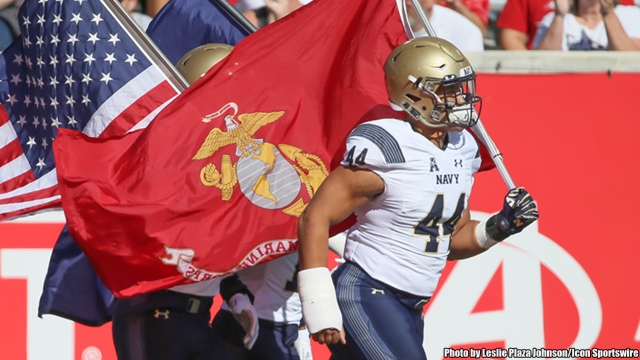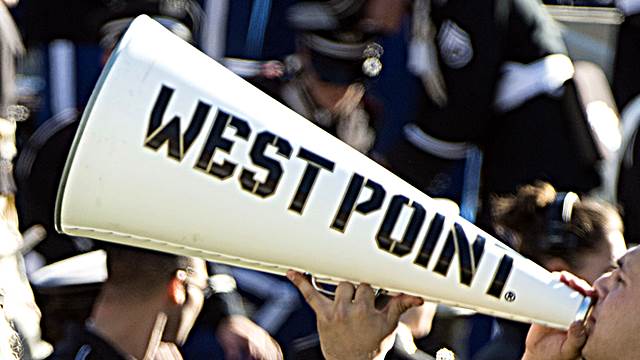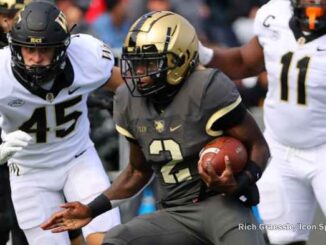
The world of service academy football took a turn for the better in Week 4. Even the one loss – by Navy – contained positive elements.
Army, the favorite to win the Commander-In-Chief’s Trophy, scored a 23-10 win over Miami of Ohio at home in Michie Stadium. Christian Anderson busted two long runs (both over 70 yards) to give the Black Knights a quick injection of offense, but there is certainly some reason for Jeff Monken to be concerned about the path forward. Army’s offense was contained other than those two runs. Against elite opposition – such as the Cincinnati team Army played last year – or in a CIC Trophy game versus Air Force or Navy, scoring 23 points and busting two really long runs would rate as a solid offensive performance. Recent Army-Navy games have been defensive slugfests. Scoring in the mid-20s would be likely to win a CIC Trophy game this year.
Against Miami of Ohio, that level of output indicates that Army’s offense has a lot of work to do.
It’s worth keeping in mind that Army had a breather when it played Connecticut. UConn is an atrocious team, and so while it was good that Army put that game to bed at halftime (42-0) and was able to give backups plenty of work in the second half, that game might have given Army a false sense of where it stood – and how much it had truly evolved – on offense. Players might have entered the Miami-Ohio game thinking they could impose their will on an opponent, and weren’t therefore as ready to sustain an effort over the course of 60 minutes. Getting a complete game from the offense will be a priority as Army moves into the month of October.
The defense, however, remains on point in West Point.
If the offense is leaving points on the field, the defense is making sure opponents don’t make the Black Knights pay a heavy price. If Army’s offense failed to establish the level of superiority it probably should have displayed against a team of Miami-Ohio’s (minimal) caliber, the defense played entirely up to standards and carried the day. The offense isn’t where it should be, but the defense is certainly on schedule, and maybe even a little ahead of schedule for Jeff Monken.
Air Force handled Florida Atlantic, 31-7. Two things are worth noting about Air Force’s easy win. First, the defense – which was supposed to be a strength of this roster – snapped back into focus after allowing 49 points the week before against Utah State. This is what Troy Calhoun and his staff expect. This is the standard Air Force’s defense should bring to the table against modest or mediocre opponents.
The second key point to make about the Falcons is that Utah State just got hammered by Boise State. The Aggies’ offense was smothered by the Broncos’ defense in a 27-3 loss. Though Air Force definitely righted the ship versus Florida Atlantic, giving up 49 to Utah State now looks 10 times worse (if not 50 times worse) than it did a week ago. That game can’t be allowed to linger over the rest of the season, and beating Florida Atlantic will not be nearly enough to wash out that bad taste. Air Force will need to bring an inspired defensive effort to its biggest Mountain West games of the year, especially Boise State. Only then will that ugly Utah State defensive collapse become a moment which is able to be appreciated. Air Force needs to use that Utah State game as a motivator and as a productive teaching moment, not as a game which casts a black cloud and impedes performance for the rest of the season.
Navy lost to Houston, 28-20, after having a 17-7 lead. Losing that lead wasn’t fun, and losing games still isn’t enjoyable for a team which is unlikely to make a bowl game this year, but set against the backdrop of everything which had been happening in Annapolis, this was a good step forward for Ken Niumatalolo.
His team was competitive, unlike the Marshall and Air Force games. His offense made forward strides. Offensive line play clearly improved. We saw a lot more fight from a team which vowed to play better. It did in fact play better – not well enough to win, but certainly at a much higher standard than what we had previously seen. Being able to sustain a performance for 60 minutes, instead of running out of steam midway through the third quarter, is the next challenge for Navy, the next hurdle this offense needs to clear. However, this is certainly a demonstration of evolution and growth compared to the two shockingly bad displays earlier in September.
It is striking how much has changed for Navy football: In most years under Paul Johnson and Ken Niumatalolo, giving up 28 points at Houston would have been cause for celebration. It would have been a near-certain indicator of a victory, given how proficient and potent the triple-option offense normally is. However, in 2021 (like 2020), giving up 28 points offers no assurance that the Midshipmen will prevail.
Nevertheless, building back a sense of pride on the offensive line – a cornerstone concern and point of focus for Niumatalolo and his coaching staff – was certainly achieved to a degree against Houston. That needs to continue to be developed as the season moves along.
In Week 5, Army goes to Ball State. The Cardinals are defending MAC champions but just lost a critical game to Toledo. Army has to jump on top of this game so that the Cardinals don’t gain a fresh supply of confidence. If Army pounces early, Ball State might weaken as the game progresses.
Navy hosts UCF. The Knights have had a wild, up-and-down season, but their offense is certainly potent with Dillon Gabriel at quarterback. Navy will have its hands full in one of its toughest matchups of the year.
Air Force faces a New Mexico team which just lost to UTEP. The Falcons should meet with little resistance in a game where they will seek efficiency, an escape from injuries, and minimal stress. The Falcons will have a lot more stress in the bigger battles which lie ahead.




Be the first to comment